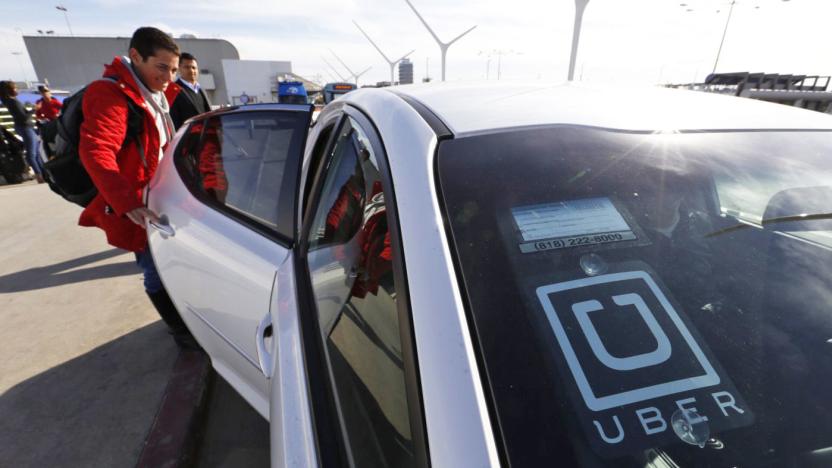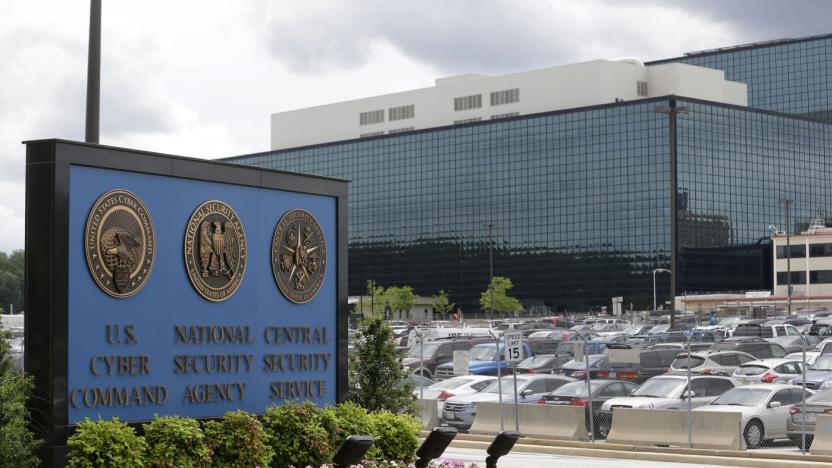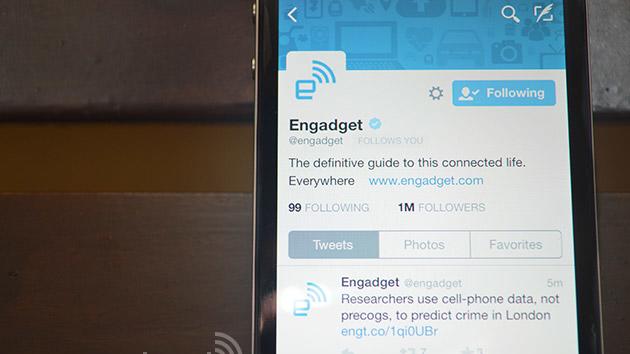transparencyreport
Latest

Uber's first transparency report details regulatory data requests
Uber faces constant criticism for its policies relating to drivers and security. Today, the ride-hailing company released its first transparency report, detailing the scope of information requests from law enforcement and regulators in the US. In fact, Uber says it's the first company to include regulatory requests in this type of report, a disclosure that Google, Facebook and others have made a habit of over the last few years. When it comes to the scale of the regulatory requests, Uber says it received 33 in the last six months of 2015. Those requests included information on nearly 14 million drivers and riders between July and December 2015.

Reddit probably got subpoena'd by the FBI or NSA
When companies receive National Security Letters (NSLs) from the FBI or a FISA (Foreign Intelligence Surveillance Act) request from the NSA, they also get a gag order barring them from telling anyone. There is one way that websites can inform users that they've been subpoena'd without breaking the law, though: Using a "warrant canary." Those are simply statements in transparent reports that indicate a site has not received a letter since a certain date. Reddit had one in its 2014 report (below), meaning it had never received a subpoena as of January 29th, 2015. Last year's report, released yesterday, includes no such remark, meaning that the company did indeed receive the dreaded letter sometime last year.

Google now encrypts over 75 percent of its internet traffic
How much progress has Google made on securing your internet traffic ever since Edward Snowden's leaks made it clear that encryption is crucial to maintaining privacy? Quite a bit, if you ask Google itself. As part of its latest Transparency Report, the search firm has revealed that over 75 percent of its internet requests use encryption. That's steep climb from just over 50 percent back at the start of 2014, just a few months after the scope of the US' mass surveillance became clear.

The NSA releases its first transparency report under the US Freedom Act
Back in June, President Obama signed the USA Freedom Act into law. The bill finally put limitations on the NSA's ability to bulk collect telephone data under the controversial section 215 of the Patriot Act. As part of the new bill, the NSA was compelled to release a transparency report detailing if it was meeting the privacy standards enacted by the Freedom Act. Today, the agency has published its first report, conducted by the NSA's Civil Liberties and Privacy Office (CLPO).

Twitter sees a big increase in account info requests
Law enforcement agencies are making social media part of more and more investigations these days, based on Twitter's latest transparency report. Between January 1st and June 30th this year, the company saw a 52 percent increase in account information requests (affecting 78 percent more Twitter, Vine and Periscope users) compared to the second half of 2014. Majority (56 percent, to be precise) of those came from the US, followed by Japan, Turkey and the UK, and only 12 percent came from non-government parties. Out of the 4,363 total number of requests, the microblogging website complied and provided info for 58 percent of them.

Amazon's first transparency report details data requests for 2015
Amazon has finally published a bi-annual transparency report (PDF), revealing the kinds of data requests it received from the government in recent months and how the company responded to them. Apparently, from January 1st to May 31st, 2015, the e-commerce giant got: 813 subpoenas - Amazon provided all the info requested for 542 of them 25 search warrants - the company issued authorities every info they needed in 13 instances 13 court orders - the court got every info it asked for a total of four times out of 13 132 various requests from outside the US 1 removal request, which Amazon granted Between 0 and 249 national security requests, including Foreign Intelligence Surveillance Act (FISA) court orders. The company can't legally publish the exact number, so you'll have to take a guess.

Google tosses 59 percent of Europe's 'right to be forgotten' requests
How is the European Union's "right to be forgotten" faring a year after it kicked in? If you ask Google, it's more than a little messy. The internet firm has published an updated Transparency Report which reveals that the company rejected about 59 percent of the search result takedown requests received to date. While it doesn't break down exactly why it's tossing those requests, its examples typically include criminals trying to hide their unpleasant pasts and professionals embarrassed by their earlier work. And to no one's surprise, the top sites under the crosshairs are typically social services like Facebook, Google+ and Twitter.

Kickstarter transparency report shows crowdfunding's copyright woes
If you've noticed a crowdfunding project that was ripping off someone else's work to make a pitch, you're not alone. Kickstarter has posted its first transparency report, and it notes that there were 282 Digital Millennium Copyright Act takedown requests in 2014 -- a notable amount considering that there were 68,668 total projects that year. The company only took action against 44 percent of them, but that still means that it had to scrub content (or in some cases, whole projects) in 123 campaigns.

Snapchat transparency report shows cops don't care about your junk
Snapchat's spent the better part of the last year doing its best to dispel the notion that it's just an insecure way of letting people see your genitals. It's already started to refashion itself as a media platform and a money wire service, but now the company is introducing transparency reports to show that you can trust it. Unlike others in the tech space, Snapchat didn't wait a full six months before revealing how many requests it received, so this first report only covers the four months between November '14 and February '15.

Russia, Turkey and the US wanted more of your Twitter data last year
Twitter might not have the easiest time getting new users, but it's having no problems attracting nosy governments. The social service just published its transparency report for the back half of 2014, and there was a gigantic 40 percent spike in data requests led by just a handful of countries. While the surveillance-happy US certainly contributed to that figure with a 29 percent increase, the biggest culprits were countries that overtly clamp down on freedom of expression. Russia went from making no account info requests at all to more than 100, while Turkey's interest shot up 150 percent. And Turkey is undoubtedly a fan of censorship. While Russia's attempts to quash political opposition helped fuel 91 takedown requests, Turkey asked for a whopping 477 takedowns -- not surprising given its attempts to demonize social networks that allow easy criticism of political leaders.

Reddit posts its first transparency report
Reddit may not be subject to as much legal scrutiny as tech giants like Google or Microsoft, but there's enough of it that the internet community has published its first transparency report. The site says that it received 55 demands for user info through subpoenas, search warrants and emergency requests in 2014. That's a tiny amount compared to the 174 million total redditors, but that makes it a bigger target than Dropbox and other services that you'd think would be more conducive to secret activity. The site had a bigger problem on its hands with 218 copyright and trademark takedown requests, although it's not clear if that includes any calls to pull celebrity photos stolen in last year's iCloud breach.

Dropbox now reports when non-US governments want your data
While Dropbox was quick to embrace transparency reports, it's been pretty opaque about data requests from outside the US. How do you know which countries want your info? You don't have to wonder any longer. The cloud storage outfit has published its first transparency report revealing data requests from beyond American borders. There aren't many at all (just 20 in total), but it's clear that some governments are nosier than others. Half of all requests came from France and Germany, while the rest are spread between nations as far-ranging as Australia and Brazil. The report now covers the number of accounts affected by these demands, too. More detailed stats won't do much to end intrusive surveillance, but they'll at least let you know who might be poking around your online files.

Google makes government takedown request data easier to understand
While Google has long been publishing transparency reports on government takedown requests, its most recent one for June to December 2013 gives us details the company hasn't shared in the past. In it, Mountain View doesn't only explain how it deals with these requests, it also lists some examples. Apparently, in order for the company to begin the process, it needs to receive written requests or court orders from governments -- Google also has to authenticate every document it receives, because it gets forged court orders every now and then.

Google details how Europeans are wielding their 'right to be forgotten'
It's no secret that plenty of people are using (and abusing) the European Union's "right to be forgotten" online, but have you wondered just how these requests tend to break down? You won't have to wonder for much longer. Google has updated its Transparency Report with a new section for European search removal requests, letting you see how many requests it gets in a given EU country, how often it honors them and which websites are typically affected.

Twitter sues US government over Transparency Report restrictions
Twitter has been publishing what bits of info it's allowed to concerning national security requests for some time now, but the social media feed wants the ability to publish the whole thing. Today, the outfit filed a lawsuit aiming to get approval to post its entire transparency report. In a blog post, VP of Legal Ben Lee says that the company is asking a California District Court "to declare these restrictions on our ability to speak about government surveillance as unconstitutional under the First Amendment." As is stands, Twitter and others can't communicate the exact number of national security letters (NSLs) or FISA court orders, even if there aren't any. If you'll recall, it tried to beef up transparency outside of court earlier this year, but Twitter couldn't come to terms with the US Department of Justice and FBI on as much as a redacted version of the full report.

Google's new Chrome add-on secures your email every step of the way
Privacy advocates (including Edward Snowden) will tell you that one of the better ways to evade internet snooping is to encrypt data end-to-end, so that people can't casually peek at what you're doing. Well, it's now considerably easier to do just that -- if you're using Chrome, anyway. Google has released an early version of an appropriately named Chrome add-on, End-to-End, that secures your web-based email beyond what providers usually offer. Instead of setting up complicated encryption tools, you just use the extension; after that, messages you send or receive can't (easily) be read unless the recipient has the necessary key.

Time Warner Cable says 'me too,' issues first transparency report
Not to be outdone by its competitors (or future owner), Time Warner Cable has released a transparency report of its own. From January to June last year, the telco obeyed some 12,000 information requests from the government that break down as such. Of the legal requests, 82 percent were for subpoenas, 12 percent were for court orders and four percent related to search warrants. Seventy-seven percent of the time that data was requested, it was subscriber and transactional info that was disclosed, 20 percent resulted in no data shared at all and three percent of the time, content information was disclosed. Because the report doesn't give exact numbers, though, comparing the precise amount of requests that TWC handled with its competitors isn't exactly easy.

Comcast's first transparency report reveals over 25,000 government data requests
Comcast must not want to feel left out as telcos begin publishing regular government data request statistics -- the cable giant has just posted its first transparency report. The document reveals that Comcast obeyed more than 25,000 government demands for info during 2013, including 24,698 criminal requests (such as warrants) and 961 emergency requests. There isn't as much detail for national security requests due to federal rules, but the report shows that Comcast isn't under quite as much scrutiny as its peers. The provider received less than 1,000 national security letters last year, while Verizon reported between 1,000 and 1,999; AT&T says it got between 2,000 and 2,999. The differences aren't surprising when Comcast has no cellular customers these days. However, those numbers are bound to grow if Comcast succeeds in buying Time Warner Cable.

The NSA may release its own transparency reports
The NSA has been on the offensive lately, first claiming that Google, Facebook and others are fully aware of its data-collecting practices, and now hinting that it'll nip criticism in the bud by releasing its own transparency reports. NSA Deputy Director Richard Ledgett, defending the agency's surveillance activities in a video interview today, said the following: The vulnerabilities we find, the overwhelming majority we disclose to the people who are responsible for manufacturing or developing those products. We're actually working on a proposal right now to be transparent and to publish transparency reports in the same way the internet companies do. This isn't exactly out of the blue. Apple, Facebook, Google and several other web giants have long expressed frustration at the NSA's lack of openness in the wake of Edward Snowden's PRISM leaks. Most recently, Facebook CEO Mark Zuckerberg spoke with President Obama about the need for "trust in the internet," and a handful of high-profile companies successfully sued for the right to share more specifics about national security requests. Releasing its own transparency reports could help change public perception of an agency that's secretive by design, but it's likely the NSA's reports wouldn't be too revealing if they do indeed get published. Stay tuned.

Facebook, Google and Yahoo now say when the US government requests user content (update: Microsoft too)
Last week, the US government finally relented on letting technology companies publish more detail about national security requests; today, some bigger firms are taking advantage of the looser rules. Facebook, Google, LinkedIn and Yahoo have updated their transparency reports to reveal the range of FISA requests that covered user content like posts and photos, not just user names and other basic information. As is often the case with national security affairs, there are strict limits involved. The reports still have to cover broad ranges that aren't very helpful, and reports must be delayed by six months -- we won't get request numbers for the last half of 2013 until the middle of this year. None of the companies are completely happy with the government's move, and they've promised to keep pushing for greater accountability. It's not a perfect solution, then, but it will shed at least a little more light on the US' online surveillance activities. Update: Microsoft has also joined in.







